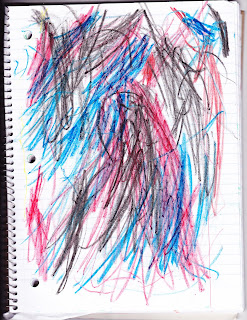Conor and Brady began attending the weekly Kodaly class when they were about 18 months old and I felt that was already late, as Hadley began at one year. From the start, Conor and Brady had dramatically different reactions to the experience. Brady was fully absorbed in the class: listening intently to the music, following Teacher, observing the older children, and mimicking hand gestures. In contrast, Conor couldn't wait for the class to end. The music was familiar to both of them, as we had listened to a CD of the class countless times. Of the two, Conor spent more time at home listening to and creating his own music out of our collection of instruments. He clearly loved music, but on his own terms.
Yet, week after week, I kept going with both boys, waiting for that day when it all came together. Year one passed...then two. While Conor's ability to stick with the class increased over time, he never once sat and participated for a class in its entirety. He knew the routine, stayed for the parts he enjoyed, left the circle when he grew disinterested, and returned to the group as his interest returned. Some activities he actively avoided, others he rushed back to join, so there was a predictable pattern to his behavior. At home, he sang all the songs and repeated many of the games, demonstrating that he was an active listener to the entire class, whether he was participating or sitting on the sidelines. He loved going to Teacher's house for Hadley's private piano lessons. Yet, each week Conor complained about going to his own music class.
Year three began last fall, and I'll admit that I was hesitant to sign them up. Let's face it: all of these activities require precious time, energy and money. We had already spent two years trying to make this work. I replicated most of the class at home, to the best of my ability. Was it time to admit defeat? I decided to give it one more class...and that was the class when it all, finally, came together.
Who knows what combination of factors finally caused Conor to sit and actively participate. Maybe it was his age (3 3/4 years). Or that he had just started preschool and was getting used to following group activities. Or he forgot over the summer break from class that he used to not participate. Whatever it was, Conor sang each and every word of each and every verse in each and every song. He sat and sang along to books. He sought out his favorite instruments. He grabbed a blanket and lay down to listen Teacher's lullabies. He sang out his goodbye. Looking at him, you'd never know that this boy had been a bystander for the previous 50 classes.
But Conor doesn't have a hearing loss-- why am I telling this story? Every parent of a hard of hearing child will tell you about living through plateaus: those long periods of time where your child doesn't show amazing progress, growth or improvement. Trusted professionals, after confirming that there's nothing else impeding development, tell you to wait it out and just keep doing what you're doing-- but that's so hard to do when there's no proof to those efforts. Plateaus exist for all people, and the message is always the same: keep on working at it, because those efforts will finally pay off.
I've had many conversations about why I should have stopped music class, why babies can't be expected to participate at this level, that it's unfair to push a child in an activity that is not enjoyed. I've had friends try this class and, exhausted after one hour of chasing down their toddler, announce that they'll try again when the child is older, that it's a waste of money otherwise, that it's too hard. Had I believed any of that, Conor would have started class again at square one, not knowing the songs, the routine, the structure, or the expectations. My actions would have suggested to my children that attendance at activities is only supported when participation is practically perfect.
Early exposure does make a difference. Continued exposure reduces lag time and gaps... whether we're talking language development or music appreciation.
 Conor during instrument time, February 2011
Conor during instrument time, February 2011
 Without seeing him in action, you'd think these are simply scribbles. You might comment on the waste of paper, the clean up, the marker on the floor, the broken crayons littering the table. But each and every one is a complex story, all of his own invention. This morning, I wrote down his words as he drew this:
Without seeing him in action, you'd think these are simply scribbles. You might comment on the waste of paper, the clean up, the marker on the floor, the broken crayons littering the table. But each and every one is a complex story, all of his own invention. This morning, I wrote down his words as he drew this:


